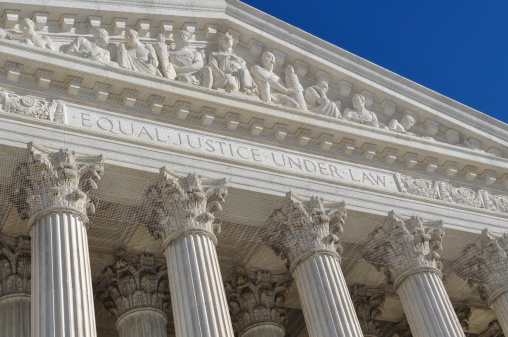
It is time to reconsider the extent to which we apply Chevron.
As this year marks the thirtieth anniversary of the Supreme Court’s landmark decision in Chevron U.S.A. v. Natural Resources Defense Council, it is both timely and appropriate to ask: have the courts gone too far in deferring to agency interpretations of the law, and indeed, to agency decisions in general?
Chevron deference, the doctrine arising from the Court’s decision, has been a guiding principle during my entire legal career. I have had the opportunity to experience it from several vantage points: first in private practice representing clients before various regulatory agencies, then during my time on the Hill as a Senate staffer drafting environmental laws, then again in my roles in the executive branch, and now finally as the chief environmental officer at GE.
From these very different vantage points, I have concluded that Justice Scalia may have been engaging in a bit of hyperbole when, on the fifth anniversary of the Chevron decision, he remarked, “[a]dministrative law is not for sissies.”
Based on my experience, administrative law, and particularly environmental law, is no more challenging than many other areas of law that our federal courts eagerly dive into every day. The interpretation and enforcement of technology patents come to mind, for example.
But challenging or not, I do think it is fair to say that the practice of administrative law has been made more frustrating by Chevron.
I have seen how Chevron can shape the application of laws and regulations, both positively and negatively; how it affects agency behavior and, in particular, the behavior of agency staff; and how it can bias the playing field in litigation, sometimes leading to patently unfair results.
All of this has led me to ask the question that I will try to answer here: is it time for us to reconsider Chevron, or at least reconsider the extent to which we apply it?
The answer, simply, is “yes.” Whether or not our environmental laws are complex, the Chevron decision, especially as it has been applied, is inconsistent with the most basic notion of our constitutional democracy – namely that three coequal branches of government serve as checks and balances against each other.
In that respect, our federal courts have a critically important constitutional role to play in reviewing agency interpretations of the law and agency decisions. Here I would agree with Justice Scalia: administrative law is not for sissies, especially if they are federal judges. Judges should not be so ready to defer to administrative agencies, as Chevron encourages them to do.
My hypothesis is that we would all be better off, as a nation and as individuals, if the federal judiciary would reassert its role more consistently in acting as a balance against the executive branch and its regulatory agencies.
The Chevron doctrine’s flaws, and problems generated by the deferential landscape that it has created, are threefold. First, there is no statutory support for the doctrine, and its constitutional underpinning is shaky, to say the least. Second, the expansion of its application has had pernicious effects, reducing the accountability of an already relatively unaccountable government-by-bureaucracy. Finally, the doctrine, especially as expanded, is generally unnecessary as a practical matter. The federal courts have often used Chevron as a fig leaf to avoid reviewing agency decisions, especially on technical matters.
I should stop here and note that I am not anti-regulation. I have been in the shoes of a regulator, and I believe that regulations are important and necessary, especially in areas like environmental protection. But I also believe that regulations must be reasonable and consistent with their authorizing legislation. Congress’s role is also important here, and at the end of the day democratic accountability is key.
I am also not naive. I recognize that Chevron probably is not going anywhere any time soon. Still, a doctrine that is so persistent – cited more than 66,000 times and mentioned in more than 13,000 federal court opinions – should be re-examined from time to time so that its application might be tempered by an appreciation of its flaws and changed circumstances.
It is clearly time to take a hard look at Chevron deference.
This essay is the first of a four-part series that draws on Ms. Klee’s remarks as the keynote speaker at the Penn Program on Regulation’s annual regulation dinner, held earlier this year at the University of Pennsylvania Law School.




